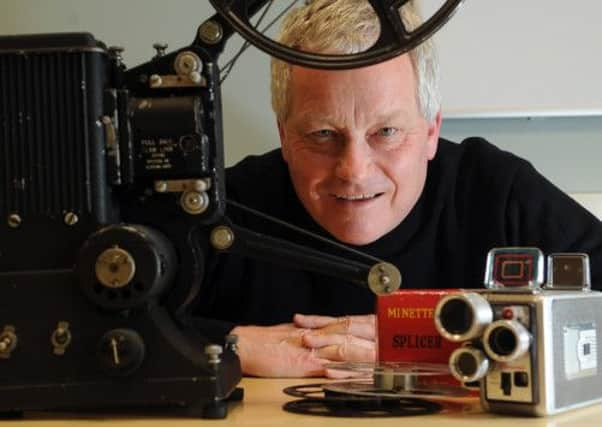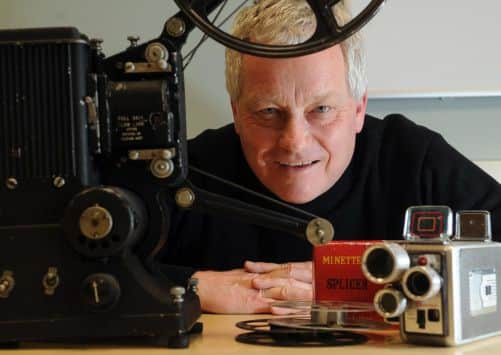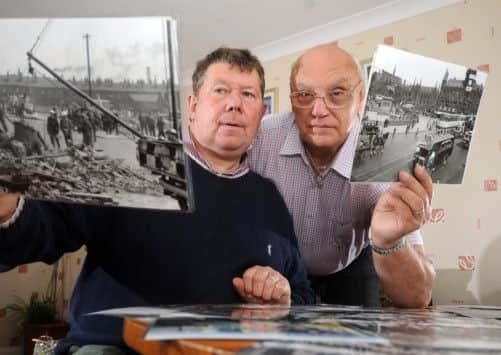Films that can fill the empty pictures as life stories go missing in the mind


What began as a back bedroom hobby in 1988 to collect old film footage is being used as a new tool to help people with dementia.
The Yorkshire Film Archive (YFA) started life with just a few reels of old footage.
Advertisement
Hide AdAdvertisement
Hide AdToday, the archive, housed at York St John University, has three vaults holding around 17,000 films, most of which was shot by amateurs. It is a largely untapped archive chronicling everyday life which dates back as far as the 1890s.


Several years ago the charity was tasked with coming up with ways to become self-sustaining. Now, a project which was given a “soft launch” last year, has been backed by those who treat and assist people with dementia and is being actively marketed as a new way of helping those who care for people with Alzheimer’s.
The Memory Bank project is a collection of six DVD packs, each of which contains six four-minute films, collected under headings such as ‘working life’, ‘sporting fun’, ‘school days’ and ‘fetes, fairs and fireworks’.
The footage itself contains all manner of things, from short clips shot by amateurs in their own homes to more official sections of video taken at public events in public spaces.
Advertisement
Hide AdAdvertisement
Hide AdWhen I arrive at the YFA, my first impression judging by the rather diminutive reception room, is that it will be a small venture but it’s an impression that’s quickly dispelled.


As archive manager Graham Relton greets me and invites me into some of the half-dozen or so back rooms, I realise that there’s much more to the YFA than meets the eye. There are rooms housing old projectors, another with a tape player the size of an average dining table and, to my surprise, these aren’t just nostalgic decor – they actually work.
Graham explains: “We keep all these old pieces of equipment because we never know what kind of footage we will get given, so we need to be able to play it and we also need to edit it, so, for example, we keep splicers to fix broken tapes.
“Sometimes the tapes themselves are warped or the sprockets are broken – we have the skills here to repair and mend them.”
Advertisement
Hide AdAdvertisement
Hide AdFootage, which can be 16mm, 8mm, 9.5mm and 35mm nitrate, is donated on a near-constant basis to the archive, a large percentage of it from the estates of the deceased.
“Quite often we’ll get footage which has been put up in a loft and forgotten about and when someone dies, the family discover it,” says Graham.
“While we can’t keep everything – our remit is it has to be about Yorkshire – we will do our best to preserve it.”
The footage itself, all 16 million feet of it, is kept inside ‘cans’ in temperature-controlled vaults and is slowly being digitised, which is why, next to the room containing the enormous tape player, you will find a bank of computer screens.
Advertisement
Hide AdAdvertisement
Hide AdI find David Wallace, chairman of public relations firm The Reputations Group, sitting in another back room. He was commissioned by the YFA to head up the Memory Bank project.
Mr Wallace is no stranger to the business world and has even worked with the inimitable Lord Alan Sugar, although he admitted they didn’t see eye to eye, adding: “We disagreed on how to run a business and so parted company.” He says the Memory Bank project is unique. “When we were developing it, we set up an advisory panel with medical experts, people from the Alzheimer’s Trust, the NHS and care homes.
“When we launched it a year ago there was no great fanfare. It was, if you like, a soft launch to see how things went.
“The idea behind it is it can be used by a group for what is called collective reminiscence therapy or just someone who is living with someone who has dementia.
Advertisement
Hide AdAdvertisement
Hide Ad“You do not just put it in the player and watch it – along the way, as the footage jogs memories, you pause it and have a discussion. That’s one of the reasons we chose not to narrate the footage.
“The idea was that while watching the films, people will be reminded of their own memories of the same era.”
Those memories could be sparked simply by the clothes people are wearing, or places or even an event.
“The films are interesting in and of themselves,” says David. “But what is more important is the memories they trigger.”
Advertisement
Hide AdAdvertisement
Hide AdPeter Smith, 65, runs a “dementia cafe” in Rothwell, Leeds, and is about to begin using the DVDs regularly.
A former help support worker with the Alzheimer’s Society, Peter, who is now retired, has his own experience of dealing with dementia.
“My mum had dementia and she lived with us,” he says. “And I realised just how much help and support you need to be able to cope with that. It’s easy to become isolated socially. That’s when I came up with the idea of the cafe. After looking around Rothwell and seeing how little provision there was for something like this, I decided to give it a go.”
The Tea Cosy Memory Cafe at Rothwell Parish Centre runs on the first Saturday of the month from 9.15am to 11.30am. When he began the drop-in sessions in October 2011 he had 11 people turn up – now he has 93.
Advertisement
Hide AdAdvertisement
Hide AdStarting this Friday Peter will begin a new weekly drop-in session, from 2pm to 4pm, which will make use of the Memory Bank DVDs from the YFA.
“We’ll see how it goes,” says Peter. “There is no talking on the films, so people can chat if something sparks a memory.”
Mr Wallace, whose previous jobs involved making TV adverts for Heinz baked beans and who also worked for Sony, said the social enterprise had so far been well received at the Alzheimer’s Show in London, held during Dementia Awareness Week (May 19-26).
“We were rushed off our feet, people couldn’t get enough of it, they thought it was brilliant. We were very pleased with the reaction. Now we just want to get the word out.”
Advertisement
Hide AdAdvertisement
Hide AdThe films themselves offer a glimpse of life gone-by, a window onto a world without mobile phones, when dustmen lifted metal bins into the back of an average-sized lorry, of children playing with toys at home, their apparel clearly of another era and festivals and of much larger public events, such as Leeds Childrens’ Day, which saw crowds numbering tens of thousands lining the sides of the cricket pitch at Roundhay Park.
Norman Postill, 58, was diagnosed with early stage dementia four years ago but he was suffering from memory problems some time before that.
“I’d do things like go out and leave the keys in the front door,” recalls the Bramley father-of-one. “It just kind of built up over time but it was two or three years before the doctor diagnosed me as having early stage dementia.”
As Norman’s condition worsened, he resorted to carrying a notepad in his pocket to write down anything he needed to remember – so long as he remembered to look at it. Forgetting to do so could lead to dire consequences, as he recalled.
Advertisement
Hide AdAdvertisement
Hide Ad“I was once nearly arrested in Tesco,” says Norman. “It was the early hours when they were trialing 24-hour opening at the Bramley store and I went there for something and I even wrote it down but when I got there I just forgot why I was there.
“Staff said they saw me wandering up and down the aisles, they eventually challenged me and, of course, I couldn’t tell them what I was doing, so they called the police.”
Luckily, they also called his wife, Christine, who came to his rescue and managed to avoid a visit from the authorities. While Norman can still function on a day-to-day basis and has not lost touch with his long-term memories, his short-term recall is limited.
“My dementia has levelled off but I will have forgotten about this conversation in about two hours,” he tells me matter-of-factly.
So what does he think about the YFA’s Memory Bank project?
Advertisement
Hide AdAdvertisement
Hide AdThe former baker and social carer said: “It’s a fantastic idea because images like that help bring back memories which would otherwise be off-limits.”
DEMENTIA: THE FACTS
Dementia can start as early as 40 and it is a progressive disease of the brain which affects memory but also judgement, personality and co-ordination.
One in 20 people suffer from dementia – there are at least 60,000 diagnosed with the condition in Yorkshire and there is thought to be tens of thousands who have yet to be diagnosed.
The number of dementia sufferers worldwide is 35.6m but estimates suggest that could reach over 100m by 2050.
Advertisement
Hide AdAdvertisement
Hide AdTo find out more about the Yorkshire Film Archive’s Memory Bank project, log onto: www.yorkshirefilmarchive.com/content/memory-bank
For the Rothwell Tea Cosy Memory Cafe, call 0113 288 9068 or 07845 935233.